It’s easy for us city-dwellers to get caught up in the rat race of life and overlook the importance of Nature, but for a local community in Sydney, they made it a point not to let their sanctuary die off.
Let your imagination take you back 300 years, to a small sheltered bay on the east coast of Australia. The bay is tucked in behind a headland which protects it from the ocean swell, it is fringed by palm trees and its golden sands lead into inviting turquoise water. Beneath the surface there are luscious kelp gardens, seagrass beds and tumbling rocky reef – home to myriad different creatures. A young Aboriginal woman is launching a canoe made from tree bark. She is equipped with fishing line which has been hand-made from natural fibres, tied to a hook carved from shell. This bay is sacred in her culture and has incredible natural beauty. There is a plentiful supply of fish here, but she harvests only what she can carry home to her family of fellow hunter-gatherers.
Now jump forward in time to the late 1980s. This bay is now known as Cabbage Tree Bay and is located only a 30-minute ferry ride from Sydney’s iconic Opera House and Harbour Bridge, in the bustling suburb of Manly. The alluring natural beauty of the bay remains, but beneath the water the scene has changed. The Aboriginal clans have been all but decimated by European colonisation, and their sustainable harvesting practices lost with them. Modern commercial fishing has come and gone, depleting the bay of the abundant marine life that attracted it there in the first place. The bay is now popular with recreational line and spearfishers due to its calm waters and easily accessible location next to the city. However, there is concern amongst locals that the fish are being taken faster than they can regenerate. To add to this concern, a sewage outfall just off the headland has caused dangerously high pollution levels. The main beach in the bay, known as Shelly Beach, has been dubbed “Smelly Beach” for this very reason, and swimmers fear for their health.
SAVING CABBAGE TREE BAY
هذه القصة مأخوذة من طبعة Issue 02 - 2018 من Asian Diver.
ابدأ النسخة التجريبية المجانية من Magzter GOLD لمدة 7 أيام للوصول إلى آلاف القصص المتميزة المنسقة وأكثر من 9,000 مجلة وصحيفة.
بالفعل مشترك ? تسجيل الدخول
هذه القصة مأخوذة من طبعة Issue 02 - 2018 من Asian Diver.
ابدأ النسخة التجريبية المجانية من Magzter GOLD لمدة 7 أيام للوصول إلى آلاف القصص المتميزة المنسقة وأكثر من 9,000 مجلة وصحيفة.
بالفعل مشترك? تسجيل الدخول

The Sea Specialist: An Interview With Bret Gilliam
Most people learn to crawl before they walk, but there is a man who learned to swim before taking his first steps. Diver, entrepreneur, writer, athlete, maritime specialist – Bret Gilliam is the complete package. Just add water.
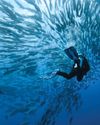
The Best Of Diving In Southeast Asia: Explore The Amazon Of The Seas
Southeast Asia encompasses the world’s most biodiverse reefs and some of the best diving anywhere on the planet. From the tiniest and rarest critters to huge fish schools and the biggest pelagics, the region has it all, and there’s something to suit divers of any level.

Below With David Doubilet & Jennifer Hayes
Best known for their work with National Geographic, David Doubilet and Jennifer Hayes came together to discuss their work with the youth, and, as Jennifer put it, “submerging with the emerging talent”.
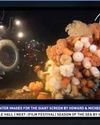
Underwater Images For The Giant Screen
Howard and Michele Hall are best known for their success in underwater IMAX filmmaking.

Journey To Filming For National Geographic Wild Brazil
Cristian is an acclaimed and highly versatile Brazilian wildlife filmmaker who works both underwater and topside.
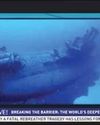
Breaking The Barrier: The World's Deepest Dive
David Strike shared a brilliant presentation about the history of deep diving and how Lt. George Wookey achieved the world’s deepest dive in 1956 using a surface-supplied rebreather.
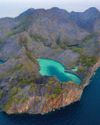
Dive the Golden Land
The Best of Diving In Southeast Asia

OFFICIAL LAUNCH OF BLUE HOPE
Top Session of the Week (14,319 (Views) / 42,831 (Reach)
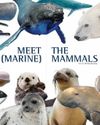
MEET THE (MARINE) MAMMALS
MEET THE (MARINE) MAMMALS

Fashion Faux Pas
What can be done to mitigate the impact of the garment industry on our oceans?